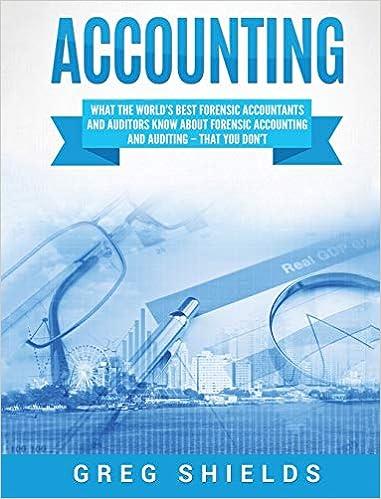Question
What is most interesting here? Accounting standard setters and regulators seek greater comparability in financial reporting. In fact, U.S. GAAP has been significantly evolving over
What is most interesting here?
Accounting standard setters and regulators seek greater comparability in financial reporting. In fact, U.S. GAAP has been significantly evolving over the years, but accounting standards are inherently complex. And, the recent changes in U.S. GAAP actually introduced new analytical challenges for investors. The existing standards provide accounting chiefs with alternative choices (e.g., inventory cost-flow assumptions, depreciation methods, accounting for derivatives) and a great deal of discretion in their estimations. In addition to the variation in accounting policies observed across industry peers, there is also considerable variation in firms accounting consistency over time. Is managers having flexibility in their accounting decisions good? Or, could deviating from industry norms and employing atypical accounting choices hurt companies and managers? In a forthcoming study, my colleagues and I found evidence suggesting significant valuation losses for firms that exhibit low accounting comparability vis--vis their industry peers. Our estimation strategy is built on a widely used value relevance model adapted from prior studies. In particular, we estimate a firms stock price as a function of its earnings, book value, and accounting comparability. Using a large sample of over 31,000 observations for the period 1996 to 2015, we estimate that investors place a $5.40 value on $1 of higher earnings per share (EPS) reported by the average firm. However, this value is much less for firms with low accounting comparability. Specifically, when accounting comparability is low, $1 of higher reported EPS is valued at $4.04. This reflects a 25% decline in the value relevance of earnings as compared with the average firm. Additional tests show that other firm characteristics do not explain this result. In contrast, when accounting comparability is high, investors value $1 of higher reported EPS at $6.76. This finding suggests that CFOs can help boost their firms value by discouraging the use of atypical accounting choices. How It Enriches How does high accounting comparability contribute to firm value? Accounting comparability enriches a firms information environment by making it easier for investors to understand financial statement information in light of comparable peer data. In fact, prior research has shown that firms with higher comparability have greater analyst followings and lower trading costs (as measured by bid-ask spread). Nevertheless, the valuation benefits of accounting comparability are not unconditional. Simply mimicking peer firms observable accounting choices may not bring about the expected benefits. There are other important considerations including (1) financial reporting transparency; (2) the strength of internal controls; and (3) auditor specialization. Nevertheless, the valuation benefits of accounting comparability are not unconditional. Simply mimicking peer firms observable accounting choices may not bring about the expected benefits. The lack of transparency in financial reporting impedes the role of accounting comparability in investors valuation decisions. For opaque firms, which consistently report a high level of discretionary accruals, accounting comparability enhances the value relevance of earnings to a smaller extent. That is, if investors cannot trust the reported earnings in the first place, accounting comparability matters less to them for valuation purposes. Accounting comparability is different from financial reporting quality. Just because a firm uses the same inventory valuation method as other firms in its industry does not necessarily ensure the quality of financial reporting for the related accounts (e.g., cost of goods sold). Reporting mistakes can still lower financial reporting quality. Thus, to realize the benefits of comparability, CFOs need to make sure that their firms have solid internal controls over financial reporting. Our results show that an incidence of internal control material weakness washes out all of the additional value attached to earnings under high accounting comparability. Finally, the auditor choice also plays an important role in how investors react to earnings reported by firms with high versus low accounting comparability. Employing auditors whose clientele primarily includes a firms local peers operating in the same industry strengthens the positive relationship between the value relevance of earnings and accounting comparability. Why do our findings matter? Many firms raise additional equity financing via follow-on offerings, which often garner skepticism from investors. But, when investors place greater value on earnings as a result of high accounting comparability, firms can raise equity financing at more favorable terms and thereby leave less money on the table. Moreover, a higher valuation of earnings can help boost the value of executives compensation packages, which often include a significant equity component. So, managers have direct incentives to ensure greater accounting comparability with industry peers. While our study focuses on equity investors valuation decisions, firms seeking debt financing may also benefit from our conclusions. In fact, creditors have been shown to consider borrowing firms accounting comparability when making their lending decisions. Accounting comparability is one of the enhancing characteristics of financial reporting in the United States and around the world. Yet, it does not seem to get enough attention from financial statement preparers. We encourage CFOs and chief accounting officers to review their firms accounting policies and align them more closely with their industry norms. Doing so may yield economic benefits both at the firm and personal level.
Step by Step Solution
There are 3 Steps involved in it
Step: 1

Get Instant Access to Expert-Tailored Solutions
See step-by-step solutions with expert insights and AI powered tools for academic success
Step: 2

Step: 3

Ace Your Homework with AI
Get the answers you need in no time with our AI-driven, step-by-step assistance
Get Started


